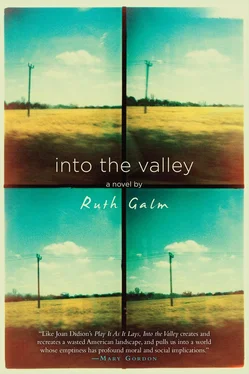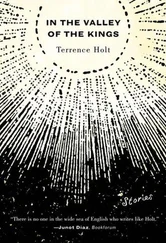She drove north along a two-lane road. The hot wind through the car made her body thick and slow. She came on an unkempt field. Plants tumbled on the ground in no order; she thought at first they must be abandoned. But the disorderliness continued from one field to the next, on and on, and eventually B. realized it must have some point and the heaps were tomato plants. Vines not tied up but splayed on the ground, leaves and fruit chaotic shades of green, yellow, red. An isolate string of eucalyptus trees bordered one side of the field. In its shade was a piece of rusted farm machinery (a thresher? combine?) and B. had the sudden urge to climb it.
She parked the car, walked over to the high metal engine, trying to ascertain its function to no avail, then hoisted herself up onto the dirty seat. Her bare legs hung down thin and pale near the gears. For miles in any direction the jumbled green plants, the faded blue sky. She closed her eyes, and in the warm, eucalyptus-spiced air, the radio song came into her mind, from the prom with the Brylcreemed boy: One lovely night, Some lovely night . She could not remember the rest. In fact, she realized, the only vivid recollection she had of the evening was the violent itch from the wire in her bustier, clawing at herself the minute she got the dress off that night, until flakes of skin drifted from her breasts and red welts swelled on her torso and her fingernails filled with blood. She stopped trying to sing the song.
She tried instead to cheer herself with the dead buttons on the farm machinery. In the pleasurable clicks and tacks, she imagined herself in denim overalls, chewing on a stalk of wheat. She wished for an old red barn and a scarecrow but the tomato fields seemed to have no owners. In the dried grass under the eucalyptus bright orange poppies like flames stood. Hard as she tried, she could not find them beautiful. The wide petals and bare stems and sharp orange in the dead grasses jarred her.
Her eye caught the image of her naked shins on the gear shaft. Bumps of black stubble now sprouted across them. It felt lewd. In her office a new girl had arrived her entire first week without stockings, until the office manager forced her to put on a pair she kept in her desk. B. had been secretly relieved. The first protest she’d ever seen in Boston, people prostrate across railroad tracks to stop commerce to the South or Asia or some place, B. had fixated not on the cause or the chants but on the women’s legs, the stockinged shins in pencil skirts and kitten heels. All the men in trousers and button-down shirts and sweaters, but the women’s legs dainty across the gunmetal tracks, out of place like the poppies in the dead grass. B. had wondered how they’d lowered themselves without ripping their skirts or running their hose. (Her mother had taught her the proper manner to sit in a skirt: guide the fabric underneath, slide hands over the line of one’s thighs, end with fingers folded neatly in lap; her mother had, aside from ski pants and the occasional summer capri, worn a dress every day of her life.) It had been naive, but B. had assumed in San Francisco people would be too sunned and relaxed to protest. Instead they protested all the time, in blue jeans and maxis and tunics and half naked, and B. could no longer hold on to anything in these scenes at all. She tried to avoid them.
Troubled by these thoughts, she climbed down from the rusty machine and kicked around in the fallen curved leaves of the eucalyptus, peeled off strips of blond bark. (The tomatoes she would not get too near.) She wondered how many checks she had in total; she’d never counted them. She got the checkbook out (she liked always to carry the ostrich-skin purse with her) and fanned it back and forth in her damp palms.
She decided she did not want to know how many there were.
A motorcycle thundered by at that moment, shattering the quiet. The motorcycles were all over the roads now, B. thought with disgust, the long pipes, the reclining riders in leather and suede.
She got in the car and drove back to one of the towns on the river. She found the old hotel, still fronted by rails for tying up horses. She lay on the poster bed until the whole room disappeared into dusk, the roses on the wallpaper turning black. Children’s voices drifted through the window in the dimness, crickets bleating, somewhere a radio playing country-western. B. tried to focus on these sounds of domesticity and summer ease. She tried not to think about the bank three doors down.
She thought how much she loved the heat. In the fog and cold of the city, she had begun to forget the time of year. Was it June or December, she never knew.
That night in her dream she was on the motorcycle. Dressed in black, fringe flying from her arms. The metal vibrating unstoppably between her legs. She began frantically in her sleep to feel for the edges of paper slips in boxes, to slide a check across a counter. She woke up, panting among the black roses. She reached for the antler, but rubbing it had no effect. To calm herself, she thought of what time the bank would open, which side she would part her hair, whether it would be the pink or the coral lipstick. She concentrated on each of these things until she was sure the motorcycle was gone.
In the morning, she took a bath in the crumbling hotel tub. A ring of dirt rose to the surface. The black grit under her fingernails loosened and she washed her hair. When she emerged from the tub she picked up the ivory sheath from the hanger and reluctantly packed it back into her bag. She had laid out a fresh dress on the bed, a sleeveless powder blue. She combed through her wet hair and drew on eyeliner. Her period was still trickling in. She put in a tampon and washed the browned blood from her fingertips and reached into the vinyl bag for the velvet box.
Her parents had given her the diamond brooch when she turned sixteen. Her mother explained that the brooch marked her passage into womanhood; her great-grandmother had worn it at her wedding and her grandmother and her mother. The brooch was in the shape of a daisy, twenty petaled chains of diamonds glinting from a dense center, so fragile and precise and dazzling it seemed it would transform her just to touch it. They’d brought out a cake with candles and after she blew them out, her mother pinned the diamond brooch on B.’s sweater, her father looking on embarrassedly. They took a picture of B. standing alone with the brooch in front of the cake.
She could recall wearing it to the prom with the Brylcreemed boy, and to her graduation luncheon and perhaps for a college mixer or two. One night in Boston, after the kind of typical day where she had shown up for work on time and done her typing and spoken politely to the attorneys and other secretaries and even had a date later that evening (one of a string of torturous set-ups through her mother during which she had the same conversation about Back Bay and the fall foliage each time), she took the velvet box out of the drawer. She pinned the brooch to her bra and stood in front of the full-length mirror. Her upper arms were muscular, her sternum hard with bone, and the brooch in the lamplight no longer looked precise and dazzling but sharp and overladen, like a brand, a deformity growing out of her. She yanked it off, the pin catching the bra and scraping her chest. Her head began to spin. She sterilized the cut, sewed up the bra and stuffed the velvet box, wrapped in several scarves, into the back of her closet. When the date arrived, she pretended to be sick.
B. stood in front of the motel mirror. The brooch shimmered against the powder-blue dress, but the effect was remote now. She fingered the encrusted petals and noticed her thumbnail was still dirty.
Читать дальше










